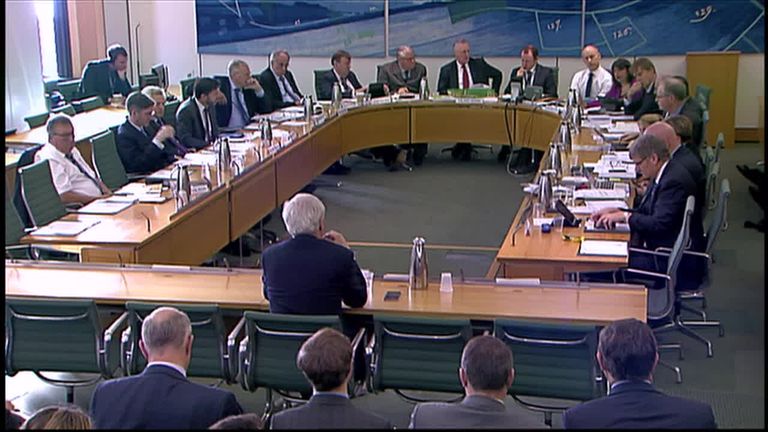Timing of Brexit deal vote could spell more turbulence for Tories
Sky's Jason Farrell eyes troubles down the line if MPs don't get a vote on a final Brexit deal until after 30 March 2019.
Wednesday 25 October 2017 22:36, UK
The confusion was etched across Seema Malhotra's face as the former shadow minister tried to follow the Brexit Secretary's logic.聽
David Davis was facing a Brexit select committee hearing and explaining how the final deal with the EU might be negotiated right up to the wire.
His suggestion was that the UK could be signing off the last details of the agreement in the small hours on 29 March 2019.
So Mrs Malhotra asked if that meant Parliament would only get a vote on the deal once Brexit had happened?.
"Yes, it could be," replied David Davis. "It can't come before we have the deal."
That comment led to an question to Theresa May during Prime Minister's questions from Labour MP Stephen Kinnock, who'd been present at the grilling of Mr Davis. Did Mrs May believe the timetable would allow a vote to take place in Parliament before the Brexit deadline?
"We are confident we will," she said, . "The timetable under the Lisbon treaty does give time until March 2019 for the negotiations to take place."
So once again some gentle probing had unearthed inconsistencies over the Government's approach to Brexit.
Alarm bells clearly started ringing in Whitehall because three hours after PMQs ended by the Brexit department.
"We are working to reach an agreement on the final deal in good time before we leave the EU in March 2019," the release said.
It then sought to reassure MPs that once the deal was agreed there would be "a vote in both Houses and we expect and intend this to be before the vote in the European Parliament and therefore before we leave."
But then the statement tried to justify what David Davis had said earlier.
It said: "This morning the Secretary of State was asked about hypothetical scenarios. Michel Barnier has said he hopes to get the deal agreed by October 2018 and that is our aim as well."
The problem is this can't be dismissed as a "hypothetical scenario" - because everything right now is hypothetical.
Nothing is nailed down in these negotiations. As both sides keep saying, "nothing is agreed until everything is agreed."
Right now, citizens' rights, further EU budget payments, future trading agreements and transitional arrangements are all hypothetical.
Mr Davis is at least drawing on the UK's previous experience of negotiating with the EU when he suggests everything tends to be agreed last minute. That's what happened with David Cameron's negotiation in January 2016.
Indeed, Mr Davis has suggested that in this instance negotiators might be using delay to apply pressure. He recently described it as "playing time against money."
Today he said: "It's no secret that the way the Union makes its decisions tends to be at the 59th minute of the 11th hour of the last day. That's precisely what I would expect to happen here."
What if he is right? Say it does drag on to the last minute? How then does Parliament get to vote on the outcome of the deal before Brexit day? It might well be out of the UK's hands.
If Parliament senses that it might lose the "meaningful vote" on the final deal, Remain-supporting MPs will be up in arms, Brexiteers will blame the EU and the Government will have to be on standby for even greater turbulence in every step of the process towards passing Brexit legislation.








